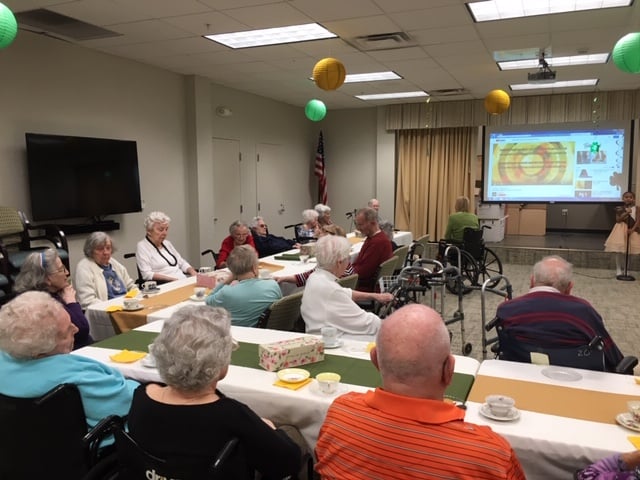
Every month, Episcopal Church Home boasts a full calendar of activities for seniors. There’s always something going on—whether it’s a creative writing class or a round of BingocizeⓇ. Often, the line-up includes some form of intergenerational programming. And for a good reason: The therapeutic benefits of connecting older adults with young people are widely known. There’s no better example than our recent Girl Scout Tea Party.
Here’s a closer look at the event, along with how intergenerational programming supports the overall health and wellness of our community members.
Cookies & Company
On March 14th, we were delighted to welcome 8-year-old Girl Scout Camiyah Edwards to ECH. Community members noshed on all of their favorite Girl Scout cookie flavors while enjoying a musical performance by Camiyah, who happens to be the daughter of ECH’s Executive Director Beverly Edwards.
A representative of Troop 290, Camiyah not only impressed the audience with her professionalism during the performance but also spent time visiting with them afterward. It was a fun, engaging event for all.
Therapeutic Benefits That Last
No doubt, our Girl Scout Tea Party was a stimulating way for community members to spend the day. But research indicates that events like this have lasting health benefits—especially for seniors with Alzheimer’s disease or an alternate form of dementia.
Of the impacts of intergenerational programming, licensed social worker Esther Heerema proposes, “It's not uncommon to witness a child enter [a senior living community] and see a dramatic change in the engagement levels of persons with dementia. Suddenly, ‘Sarah the resident’ is smiling, leaning toward the child and talking to her. If the young child is willing and walks over toward Sarah and is placed on her lap, Sarah is utterly enthralled, smiling, talking to the child and laughing.”
This observation aligns with the work of psychologist Erik Erikson, known for his theory on the stages of psychosocial development. Erikson posited that interacting with young people yields a multitude of benefits for seniors, including invigorating and energizing them, reducing isolation, decreasing the likelihood of depression and keeping family stories and histories alive.
Recent studies also show that aging adults—both with and without dementia—who interact with young children smile and converse more, have higher levels of positive engagement and even achieve a higher quality of life.
The Benefits Go Both Ways
The advantages of intergenerational relationships aren’t limited to older adults. Children also reap profound benefits from time spent with seniors.
Explains Stanford psychology professor Laura Carstensen, who also leads the Stanford Center for Longevity, “Contrary to widespread beliefs that older populations consume resources that would otherwise go to youth, there is growing reason to think that older people may be just the resource children need.”
Specifically, the attention and mentoring that children receive while interacting with older adults may be otherwise lacking in their lives. Therefore, intergenerational relationships play a critical role in helping young people develop necessary emotional skills while simultaneously laying the groundwork for a thriving future.
At the same time, both seniors and children walk away with something especially vital from their time together: a sense of purpose. According to Carstensen, “Older adults are exceptionally suited to meet [young people’s] needs in part because they welcome meaningful, productive activity and engagement. They seek—and need—purpose in their lives.”
Intergenerational programming like last month’s Girl Scout Tea Party is just one example of our holistic approach to supporting the mind, body and spiritual wellness of our community members. To learn more about memory care at ECH, along with how it can help your aging loved one maintain their physical, mental and social health in their golden years, schedule a tour today.












